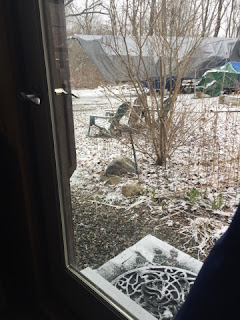Yes
In the dream I am carrying weights in a satchel on a corner of a city waiting for a student who's an inmate actually serving 59 years but somehow coming for a tutorial in a wooden door floor desk room after I've been jest ironed by three parole officers. ("Jest ironed" fits as well as the intended "questioned" in that sentence, a decision by hidden genie of iPad spelling security unbidden.)
At Friday Evening Conversation we listened to part of David Whyte and Krista Tippet discussing The Conversational Nature of Reality on this week's On Being. We are aware of dying winter and not yet spring in Maine and in our selves. And the longing for compassion, love made visible.
That's what was said in the plexiglass room with speakerphone during conversation with man 22 months in segregation speaking about his Critical Reflection noting the primary teaching of prison is the development of strong separate egos isolated from everyone and unable to be kind or compassionate to anyone. It is a pedagogy of desiccated delusion and dehumanizing deceit. It is the real punishment prison dispenses. God help the one released and those in society receiving such well educated men and women!
Here, at foot of mountain, white dog climbs stairs and lays on rug, outside single car heads toward town.
When we get to zafus in two hours we will take all this into a more solemn silence. Then we'll chant the Heart Sutra. Then read a Buddhist writing. Then reflect in ersatz teisho what is heard within and without. Then recite the four bodhisattva vows. Then invite a metta blessing. Then listen to bell chant for all beings, in all realms, at all times, from the no ones and nowhere we are.
Dreams might not come true, but they seldom lie.
Between the hidden true and the disclosing true we reside in readying alert presence preparing to be and do the nothing we are, the seeing-through what we are becoming.
In the dream I am carrying weights in a satchel on a corner of a city waiting for a student who's an inmate actually serving 59 years but somehow coming for a tutorial in a wooden door floor desk room after I've been jest ironed by three parole officers. ("Jest ironed" fits as well as the intended "questioned" in that sentence, a decision by hidden genie of iPad spelling security unbidden.)
At Friday Evening Conversation we listened to part of David Whyte and Krista Tippet discussing The Conversational Nature of Reality on this week's On Being. We are aware of dying winter and not yet spring in Maine and in our selves. And the longing for compassion, love made visible.
That's what was said in the plexiglass room with speakerphone during conversation with man 22 months in segregation speaking about his Critical Reflection noting the primary teaching of prison is the development of strong separate egos isolated from everyone and unable to be kind or compassionate to anyone. It is a pedagogy of desiccated delusion and dehumanizing deceit. It is the real punishment prison dispenses. God help the one released and those in society receiving such well educated men and women!
Here, at foot of mountain, white dog climbs stairs and lays on rug, outside single car heads toward town.
When we get to zafus in two hours we will take all this into a more solemn silence. Then we'll chant the Heart Sutra. Then read a Buddhist writing. Then reflect in ersatz teisho what is heard within and without. Then recite the four bodhisattva vows. Then invite a metta blessing. Then listen to bell chant for all beings, in all realms, at all times, from the no ones and nowhere we are.
Dreams might not come true, but they seldom lie.
Between the hidden true and the disclosing true we reside in readying alert presence preparing to be and do the nothing we are, the seeing-through what we are becoming.









Heidegger might say it was thrown there. Camus, that it was considering suicide, the only serious philosophical question. But Dogen Zenji, in a tender moment of companionship, would cross with it because he didn't know, and was willing to drop mind and body to enter the traceless enlightenment of experience.
Philosophers are lamp holders. Even when what they look for or look at is troublesome and desperately in need of creative transformation, they long to see what is there.
We don't need to be told what is there. More the need, the radical experience, of feeling for oneself what is presenting itself for our engagement.